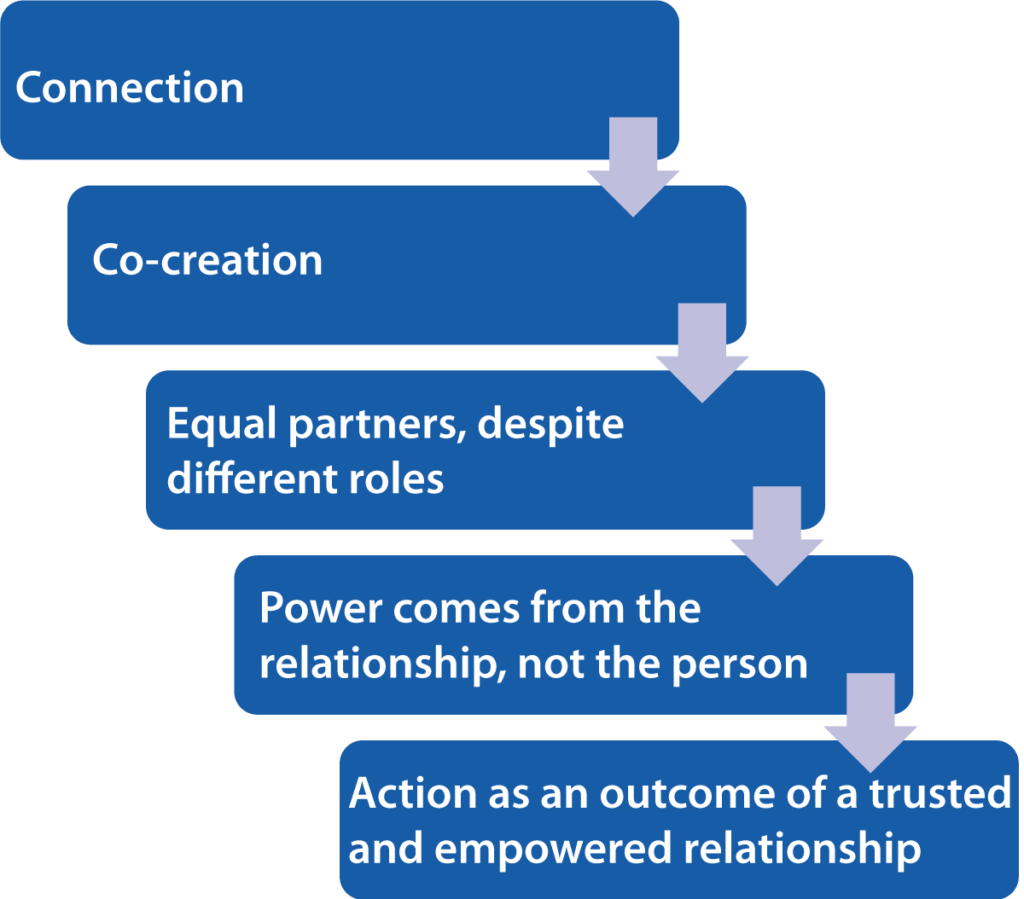TCI Global Toolkit: Coaching Essentials
Overview- Home
- Help and Support
- Close
- Toolkits
- Global Toolkit
- AYSRH Toolkit
- Hub Toolkits
- Core High-Impact Practices
- Gender Essentials Mini Course
- Close
- Resource Collection
- Community of Practice
- Coaching
- Log In/Register
- My Profile
- English
 This lesson highlights some basic background on what coaching is and its theoretical underpinning, why it is important or beneficial and to whom.
This lesson highlights some basic background on what coaching is and its theoretical underpinning, why it is important or beneficial and to whom.
What is coaching?
The International Coaching Federation (ICF) defines coaching as ”partnering with clients in a thought-provoking and creative process that inspires them to maximize their personal and professional potential.”
We must see people in terms of their future potential, not their past performance.”
– Sir John Whitmore
Sir John Whitmore, the pioneer of coaching in the 1980s, wrote Coaching for Performance in 1992, explaining that coaching is: “unlocking a person’s potential to maximize their [sic] own performance. It is helping them to learn rather than teaching them.”
The field of coaching in professional or corporate organizations has been around for 30 years. The goal is ultimately to create sustainable behavioral change that starts at the individual and group level and then diffuses to become an organizational norm.
What does coaching have to do with leadership?
A coaching leadership style of empowerment, transparency and shared responsibility is essential to a high-performance organizational culture.
“Command and control” management and leadership is no longer tenable in this fast-moving world. People need to be able to make rapid decisions and respond to changing conditions on a moment-by-moment basis. In the global health field, evidence and evidence-based guidance is constantly changing and emerging, as we all have experienced with the COVID-19 pandemic. As a result, leaders – and everyone can be a leader – need to think outside the box and be creative and innovative in finding solutions to continue to deliver quality health services in the face of natural disasters, global pandemics, commodity stock-outs and other challenging circumstances as they arise. No matter the circumstances, coaching allows individuals and teams to navigate personal and systems transformation to effect the change needed for optimal outcomes.
A coaching management style is, therefore, widely sought out because it empowers and facilitates. A coaching management style:
- Improves alignment
- Creates empowerment
- Increases engagement
- Develops people and performance
- Improves creativity
- Raises responsibility in employees
What’s the theoretical underpinning of coaching?
Coaching was developed with the five assumptions of Malcolm Knowles’ Adult Learning Theory (Andragogy) in mind. It is a vehicle to support the adult learner (Cox, 2006).

The very definition of coaching embodies these assumptions. In that, it involves the following elements that build off of each other.

Where does coaching belong?
In order to truly affect change, we need to start with the individual or self. Revisit his/her values, principles, beliefs in relation to the challenges that we face in the systems in which we work. Identify what needs to change and then make the necessary personal adaptive responses. Coaching can help us to see challenging situations with more objectivity and identify the skills needed to reach the ideal self – let alone, a changed situation.

Why coach?
Coaching can address both personal and professional skill development that is not possible in any type of classroom or eLearning setting. In addition to providing opportunities to acquire valuable skills and knowledge, coaching involves the opportunity for individuals to set stretch goals and receive one-on-one guidance. Coaching provides a safe space for individuals to learn valued skills that help them reach their full potential.
Why coaching matters?
The figure below shows what actually happens after training if no coaching is provided: old behaviors quickly resurface, and sustained performance improvements never materialize. Without coaching, the opportunity that training provides for permanently improving behavior—and for the improved results that could have followed—is lost.

What actually happens with a new skill (without coaching). Source: Adapted from Training and Development Journal (Nov. 1979)
Coaching helps those who receive coaching (also referred to as the coachee or client) to:
- Develop a new awareness
- Become more strategic
- Actualize mindset shifts
- Enhance decision-making
- Build confidence
Benefits of coaching to the public health sector
Coaching individuals and building the coaching capacity of individuals in a dynamic system, like the public health system, greatly benefits the system itself. For example, coaching:
- Reduces turnover as individuals see that the system and others within it are invested in them.
- Ensures solid leadership succession by transmitting values and behaviors to the next generation of leaders.
- Improves performance and productivity of both coaches and coachees.
- Improves organizational climate; coaches help leaders understand their impact on others and on organizational success in terms of improving health outcomes.
- Increases commitment and engagement of high potential leaders and other staff in general.
- Creates a working culture that actively supports and values learning.
- Creates trust and builds better professional relationships.
Rewards for you, the coach
Finally, you, the coach, also experience many benefits from serving as a coach, especially within the public health system which is working to address some of the toughest challenges that we collectively face as community members.
- Coaches are viewed by others as contributors to the health system’s future.
- Coaches have a chance to make a difference in the health sector.
- By coaching others, coaches review, renew, and upgrade their own professional skills.
- Coaching provides an opportunity to advance one’s own career, both internally and externally.
- Organizations respect coaches as developers of leaders.
- Coaches increase their own capacity for leadership.
- Coaches gain intrinsic rewards for contributing to the professional development of others.
- Coaches receive open appreciation for the work they do with leaders.
TCI APP USERS PLEASE NOTE
You will only receive CERTIFICATES by email – when earning a score above 80% – and will not be able to view or print a certificate PDF from the TCI app.
Test Your Knowledge
Earn a Certificate
Quiz Summary
0 of 4 Questions completed
Questions:
Information
You have already completed the quiz before. Hence you can not start it again.
Quiz is loading…
You must sign in or sign up to start the quiz.
You must first complete the following:
Results
Results
0 of 4 Questions answered correctly
Your time:
Time has elapsed
You have reached 0 of 0 point(s), (0)
Earned Point(s): 0 of 0, (0)
0 Essay(s) Pending (Possible Point(s): 0)
Categories
- Not categorized 0%
- 1
- 2
- 3
- 4
- Current
- Review
- Answered
- Correct
- Incorrect
-
Question 1 of 4
1. Question
What is coaching?
CorrectIncorrect -
Question 2 of 4
2. Question
Benefits of coaching include:
CorrectIncorrect -
Question 3 of 4
3. Question
Which of the following is NOT a characteristic of adult learners:
CorrectIncorrect -
Question 4 of 4
4. Question
True or false: coaching only benefits the coachee, not the coach.
CorrectIncorrect



